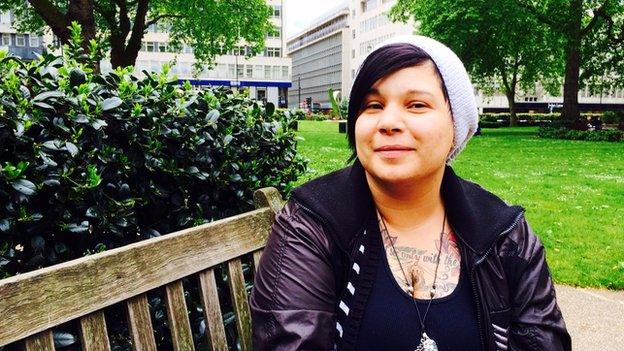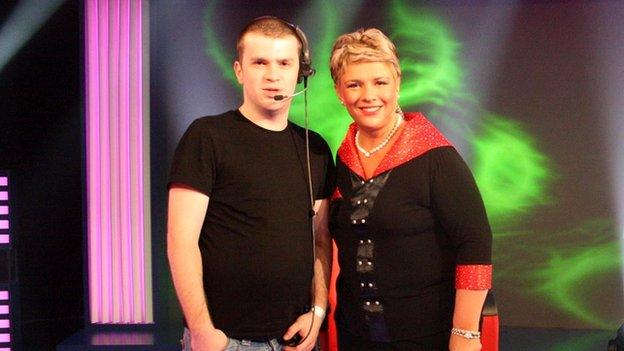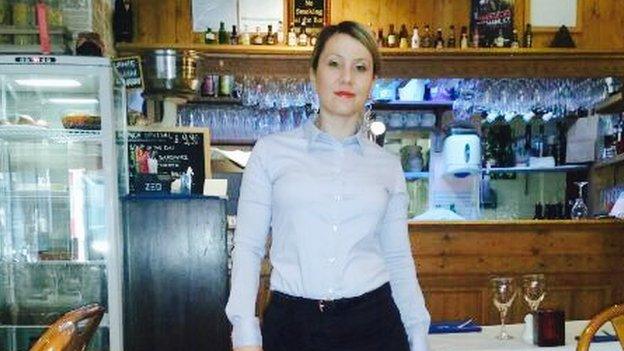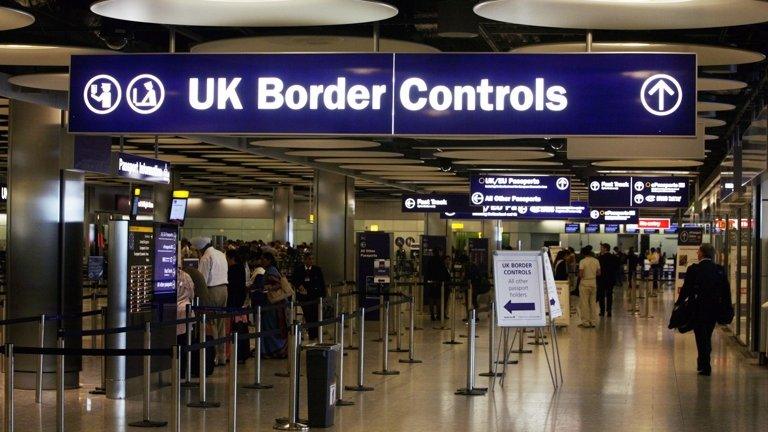Who are the people arriving from Bulgaria and Romania?
- Published

Nina Ianakieva arrived in the UK in May and is hoping to get a job before she embarks on a course in October
Figures out on Wednesday give the first indication of the number of Romanian and Bulgarian migrants working in the UK since controls were lifted in January. So who are the people who have decided to come?
"I arrived last week. I don't have a job yet, but I have skills."
Georgi Stancualte, 25, from Transylvania in Romania, is staying with cousins in London and plans to work in construction, despite recently qualifying as an engineer.
"I came to the UK because I can't find a job in Romania. The changes make it easier for me," he says.
As of 1 January 2014, Bulgarians and Romanians gained the same rights to work in the UK as other EU citizens, meaning Mr Stancualte no longer needs a visa.
The changes came amid fears Britons would lose out on jobs, with UKIP warning of a "massive influx" of migrants.
Official figures, external show there were 140,000 Romanians and Bulgarians employed in the UK from January to March 2014 - down by 4,000 on the final quarter of 2013, but up by 28,000 compared with the same time last year.

Post-2014, Mr Stancualte is among others making a fresh start in Britain.
Nina Ianakieva, 33, from Bulgaria, arrived in May and plans to start a web design degree in London this autumn. She stayed with friends while searching for jobs. "I apply for basically everything I see," she says.
"I don't know if I would've considered this before January. It eases the stress to know you can get a job and be a legal person."
'The holy land'
European Commission statistics show Romania and Bulgaria each have a minimum wage of less than £150 per month.
Many people arrive unable to speak English and with huge expectations, desperate for work, insists Cristian Kuszai, 29, from Romania. "They think the UK is like the holy land or something."
Mr Kuszai, formerly in TV production, found work as a car dispatcher after arriving in February.
"The UK is a good country with more chances but you must take it step by step, get national insurance and a job - only afterwards bring your family.
"Another common mistake is going straight to London. The rent is really high so it can be better to go to other cities."

Cristian Kuszai worked in TV and events before settling in the UK
For some, working in the UK was always an option.
Georgi Chilikov, 29, from Bulgaria, arrived on 2 January having been offered a financial services job last year.
He says financial firms had procedures to bring staff over. "They were already hiring Bulgarians if they liked the candidates."
Agricultural workers and labourers were also able to work legally in the UK before controls were relaxed, often by registering themselves as self-employed, he explains.
"I don't think there's a dramatic difference in the situation since 2014."
But Migration Watch UK says the latest figures still "suggest there'll be a continuing flow of Romanians and Bulgarians" to the UK.
Vice chairman Alp Mehmet adds net migration is "putting pressure on public services, housing and the environment".
'Undesirables'
So how welcome have newcomers felt?
"I've faced no discrimination," says Cristian Kuszai. "Some people really don't want to work and that's upsetting. But there are lots of decent hardworking people too."
Others cannot give their views easily due to the initial language barrier, although people learn quickly, adds Mr Kuszai.
For Nicolae Ratiu, director of the Romanian Cultural Centre, the media storm has been a "farce" of scaremongering.
He adds: "Tony Blair wanted Romania to come into the EU, and Romanians also knew Prince Charles was a supporter. So there was a sense of puzzlement - we thought we were wanted and all of a sudden we are branded as undesirables."
The press depicts people living four-to-a-room and sleeping in shifts. This is for a reason, Ratiu says. "Many people live very, very frugally, and send money home."

Monica Trandafir, from Romania, is saving up to start a restaurant
Indeed, engineering graduate Georgi Stancualte says he may be gone within a year after building up some cash. "I have things to do," he says.
Some of those who arrived ahead of 2014 are also saving. Monica Trandafir, 28, from Bucharest, got to the UK in December and works in an Italian restaurant.
A trainee lawyer with two degrees, she could be earning as little as £200 a month back home. Instead, she lives with a friend in a double room near Heathrow, and saves £300-400 a month.
Now her dream is to open a restaurant, possibly back in Romania.
"It is my observation," says financier Georgi Chilikov, "that people who come here are very motivated, so they perform well. It makes the structure more competitive and brings the quality of the workforce up."
Romanians and Bulgarians, he says, will be working a lot of hours and paying taxes. "So it's really positive in my opinion."
- Published20 December 2013

- Published18 December 2013
